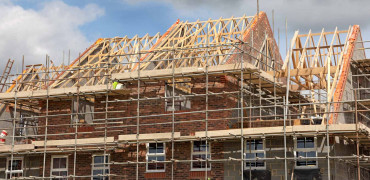Last week, the Government brought forward an Energy Security Bill as part of the Queen’s Speech, which sets out the policies and the proposed legislative programme for the new Parliamentary session.
Although the news was full of the fact that this was the first time the Queen had been unable to deliver the speech since 1963, with Prince Charles stepping in to deliver the address in place of his mother, there was another important omission that hasn’t yet gained any coverage.
The Energy Security Bill is designed to deliver the transition to cheaper, cleaner, and more secure energy and will deliver the Government’s commitments in the British Energy Security Strategy and the Ten Point Plan for a Green Industrial Revolution to build a more secure, homegrown energy system that is cleaner and more affordable.
Although the bill focuses on new proposed legislation, there was no mention of how this builds on existing plans, such as the recently published ECO4 initiative, which is the fourth and final phase of the Government’s Energy Company Obligation (ECO).
So, the existing homes challenge can also be met using existing technology.
The end of gas is imminent
While previous initiatives for sustainable heating have been aimed at homeowners with the funds to change and upgrade their heating systems to more sustainable and renewable technologies, ECO4 is looking at social housing and low-income households.
Published on the 1st April 2022, by the Department for Business, Energy & Industrial Strategy (BEIS), ECO4 2022-2026 is part of the Energy Company Obligation Government Response.
The initiative is focused on ‘low income, vulnerable or fuel poor households in band D-G homes’ and covers solutions such as roof insulation, solid wall insulation and boiler replacement.
The changes made from ECO3 to ECO4 clearly demonstrate that the government is taking a harder stance on gas boilers for social and low-income housing.
Around 20% of all UK carbon emissions are created by heating buildings, so we must find ways of significantly reducing the amount of carbon emissions in homes, if we are ever to get near the legally binding targets that have been set.
This comes on the back of the BUS (Boiler Upgrade Scheme) which I’ve written about on the Hub before, and which offers grants to homeowners to encourage the uptake of renewable heating systems.
When you add in the complete ban on gas boilers for new build homes from 2025, it’s clear to see that we really are nearing the end of gas as the dominate form of heating for UK homes.
A limit on gas boilers
Although ECO4 won’t come into effect until July, it is interesting how the model is changing to look at social and low-income housing rather than those who can afford to pay for improvements to their homes – which is what the BUS aims to do.
Under ECO4, there will be no obligation on landlords to repair broken boilers if they are inefficient.
Instead, they will have to be replaced with an efficient heating system that meets ECO4’s requirements.
Part of ECO4 will see heating installers given money to carry out efficiency works in low-income households.
The hope is that this will incentivise social housing providers and their heating installers to opt for the low-carbon option when upgrading these homes.
There is also a cap on how many gas boilers can now be fitted and this will therefore increase the volume of heat pumps installed and subsequently help to lower the overall installation price for renewable heating systems.
The road to net zero
And it’s not before time as the country has strict legal targets to achieve net zero that we will simply not be able to achieve if we carry on with gas.
In 2008, the Climate Change Act was passed committing the UK to reducing its greenhouse gas emissions by 80 per cent by 2050, compared to 1990 levels.
This target was made even more ambitious in 2019 when the UK became the first major economy in the world to commit to a ‘net zero’ target, which requires the UK to bring all greenhouse gas emissions to net zero by 2050.
So, we have a legally binding climate change target and, by law we must find ways to reduce carbon emissions.
One major challenge to this is that around 20% of UK carbon emissions are created by heating buildings and we have to find ways to significantly reduce this to get anywhere near reaching our target.
According to the Energy Saving Trust “Household emissions from heating and hot water must reduce by 95% to reach 2050 net zero targets.”
The Energy Saving Trust also says that “this will require a significant change to the current UK heating market.”
The good news is that technology already exists – in the form of heat pumps, to help reduce emissions and provide reliable, renewable heating for millions of UK homes.
There do remain challenges on the road ahead, and heat pumps are not the only option, but they remain the most cost-effective, viable and sustainable solution for many existing properties, and they are available right now.
Hydrogen is the answer to other challenges
Many are pushing for hydrogen as a way of preserving the existing gas network and allowing homes to continue using gas boilers.
Whilst hydrogen heating has been proven in limited trials, and may suit isolated communities such as the Orkney Islands, the technology is still very much in its infancy.
There other issue is that when hydrogen technology becomes viable, there are other sectors and industries where its use will make much more carbon reduction sense than home heating.
Michael Liebreich, CEO of Liebreich Associates. And Managing Partner of EcoPragma Capital has produced a really interesting ‘Clean Hydrogen Ladder’ which places the use of hydrogen in a table of A to G ratings, to show those that are unavoidable and those that are uncompetitive.
Domestic heating is rated as ‘F’ in terms of being uncompetitive, against ‘A, B and C’ rated sectors such as Fertilisers, Shipping, Off-road vehicles, Steel production, and Long-haul aviation.
Even High-temperature industrial heat (D) and Commercial heating (E) come ahead of domestic heating on the ladder.
So hydrogen for home heating will offer only a limited solution and also cannot tackle the country’s immediate need.
Quick wins
Upgrading the estimated 27 million existing homes does present a challenge but many have already seen home improvements in terms of insulation to improve their thermal properties, whether that is from previous government or industry schemes or from individual improvements that homeowners have made themselves.
We would always promote better insulation to a property being considered for a heat pump as this is the best way of not only reducing the emissions from the property, but also helps ensure that you get the maximum benefit from the renewable heating system.
However, heat pumps will also work in properties that haven’t yet been upgraded and as a manufacturer, we’ve seen thousands of installations where the renewable heating is working alongside the existing gas or oil heating, to help deliver reliable hot wate and heating in a more sustainable way.
So, the existing homes challenge can also be met using existing technology.
Training installers
Another challenge is ensuring that we are giving engineers and heating installers the right skills to install heat pumps and this is where blended learning can really help.
Over the last two years of the pandemic, we have completely revamped our heat pump training and we are now able to reach far more engineers and present them with training at a time to suit them, which also reduces costs for them and cuts down the amount of time away from the ‘tools’.
You can find out more about our award-winning training here.
With ECO4 focusing so much on the installer-base, this is another vital area that we as a nation must improve.
We must ensure that heat pumps, which operate differently to high-temperature, high carbon gas and oil, are designed, installed and commissioned correctly right from day one.
We will get there though and, although we’ve still some way to go on the road to net zero, one thing is clear, we have the technology already and we are training the installer-base to match the government’s ambitions and incentive schemes.
So let’s grow the heat pump market to fully take advantage of the benefits for homeowners, tenants, landlords, the wider society and help reduce the nation’s carbon footprint.
Russell Dean is Head of the Residential Product Group



